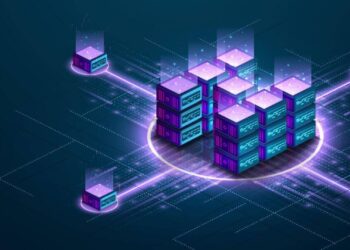As a result of its adaptability, capacity, and simple data access, blockchain cloud storage or decentralized data storage is becoming the alternative of choice for more and more enterprises. Due to the high levels of redundancy, load balancing, data integrity, and backup possibilities offered by the cloud, many businesses have already moved their data centers there. Utilizing Blockchain technology for cloud storage is one of the most chosen trends. Why and how?
In this guide, you can learn what blockchain cloud storage is, the advantages of blockchain cloud storage, the best blockchain cloud storage companies, and more.
Table of Contents
What is blockchain cloud storage?
Blockchain storage is a method of storing data in a decentralized network that takes advantage of users’ free hard drive space worldwide. A decentralized infrastructure can address several issues in a centralized system and is an alternative to centralized cloud storage.

Distributed ledger technology is essential to the blockchain (DLT). The DLT functions as a decentralized data store on transactions between different parties. Operations are recorded as blocks in the ledger and filled in the DLT chronologically. A blockchain is made up of connected blocks, and each refers to the block before it.
Data is separated into numerous encrypted pieces connected by a hashing method in blockchain cloud storage. Each of these guarded segments is located in a different decentralized location throughout the network. Strong security measures include hashed blocks, public/private key encryption, and transaction ledgers. It guarantees trustworthy and strong security against hackers. Due to the complex 256-bit encryption, not even skilled hackers can decrypt the data.
What is decentralized cloud storage?
Decentralized cloud storage is a type of cloud computing where data is kept across several computers or servers, with these machines being hosted by participants in the decentralized cloud. It is a decentralized P2P (peer-to-peer) cloud storage solution. Your files are protected in this cloud solution using blockchain technology and cryptography to encrypt information. Data is spread out throughout a network of computers, making it a simple and affordable option.
Decentralized or distributed cloud storage operates quite simply. A P2P network connects all the workers or participating users and keeps data in a very safe, decentralized manner. The files are automatically divided into little data chunks using blockchain technology and disseminated over many nodes worldwide.
Cryptocurrency is used to pay the users who rent out their extra storage space and the end users who use this space and upload their data. Therefore, no single, centralized authority holds all of the data. Decentralized storage distribution seems to be greatly aided by the availability of direct web browser access to cloud storage.
There are numerous decentralized cloud storage options accessible right now. These platforms use diverse technologies and approaches to target distinct market segments for cloud services. There are platforms made specifically for individual customers, B2B solutions, and platforms that concentrate on particular use cases, like privacy.
Decentralized cloud storage refers to the storing of data on a group of computers rather than a network under the supervision of a single central authority, as in centralized cloud storage. The information is kept on numerous computers, which participate in decentralized storage networks or serve as nodes.
Decentralized cloud storage is faster, cheaper, and more secure than those already in use. Because of that, blockchain cloud storage companies are on the rise with the help of the advantages of blockchain cloud storage.

Advantages of blockchain cloud storage
These are the crucial blockchain cloud storage advantages:
- Security & Efficiency
- Fair pricing
- No data tampering
- Fast
- Strong tracking provisions
- Less data loss
- Transparency
- Self-sustainable mechanism
What do they mean? We have explained them in detail.
Security & Efficiency
Users of distributed cloud storage are linked in a safe peer-to-peer network, giving them a decentralized means to store their security-sensitive data without compromising it.
The use of Blockchain technology to store your data has numerous additional strong advantages. It can speed things up by up to 10 times while cutting costs in half. Distributed cloud storage cleverly blends security and transparency using the hash function, public/private key encryption, and secured transaction ledgers.

The clients have been protected from numerous security risks thanks to the cloud-based decentralized storage. Additionally, client-side encryption limits end-user access to encryption keys and unencrypted information to only them. The clients have total control over their various data assets thanks to all these considerations.
Fair pricing
Storage nodes in any decentralized storage network constantly compete with one another because only the strongest ones are often rewarded. Anti-competitive behavior, monopolies, and unjust pricing are extremely unlikely in the presence of such competition.
As a result, you can anticipate receiving reasonable pricing when utilizing decentralized storage.
No data tampering
Maintaining the integrity of the original data while it is being stored in the cloud is one of the main problems. A reliable means to track storage and backup history and verify that the original data hasn’t been altered is made available by the intrinsic verifiable architecture of Blockchain. Instead of keeping actual data, it simply keeps encrypted hashes of connected data blocks, allowing users to trace the provenance of the material.
Fast
With centralized storage systems, network bottlenecks are frequently encountered because the network traffic might occasionally overwhelm the servers. But in a decentralized storage network, different nodes each store a copy of the data. Because you can quickly and securely access your data from many nodes, this removes the possibility of network bottlenecks.
Strong tracking provisions
The Blockchain automatically arranges the data in a verifiable order by connecting the various blocks in a particular sequence through cryptographic hashes. Every block is connected to the ones before it, creating a distributed ledger of transactions that is decentralized, encrypted, and verifiable.
Less data loss
Millions of nodes typically participate in any decentralized storage system and store your data. This facilitates the creation of numerous copies and guarantees that there will be no data loss in the event of any unforeseen events, such as, for example, a region shutting down.
Transparency
Since blockchain technology offers total transparency, any unsavory conduct in the network can no longer be hidden. Additionally, because each transaction is stored sequentially, it is always possible to verify it. Blockchain-based cloud storage also makes it possible for immutable transaction records to be used to confirm ownership and identity by assembling a robust, well-organized, and interconnected mesh of blocks.

Self-sustainable mechanism
A blockchain’s distributed and hash-encrypted ecosystem contributes to developing a reliable ecosystem, proactively guards against handling and fraud, and ensures that no member violates any compliances.
A robust technical option for automatically enforcing condition-based incentives and penalties is using smart contracts. In essence, it is comparable to self-sustaining machinery capable of automatic, autonomous, and precise operation. The Blockchain is evenly dispersed among many systems, not just one, which gives it resilience against significant attacks.
Many global firms know these advantages and already invest in blockchain cloud storage companies.
Best blockchain cloud storage companies
A blockchain technology-powered cloud storage is a platform for storing files with an open, distributed design that doesn’t need numerous servers to store, retrieve, or replicate data. To protect data integrity, distributed systems use redundancy of files on various nodes. Decentralization aims to give more users worldwide faster access to the same file stored on a vast network of connected computers. So, what is the best decentralized cloud storage?
- Storj
- Sia
- Filecoin
- Internxt
- Akash Network
So, let’s take a closer look at them.
Storj
Storj wants to be the storage layer for the decentralized internet and is on a mission to allow a decentralized future. The business developed Storj DCS, the first decentralized cloud object storage network, to make this a reality.
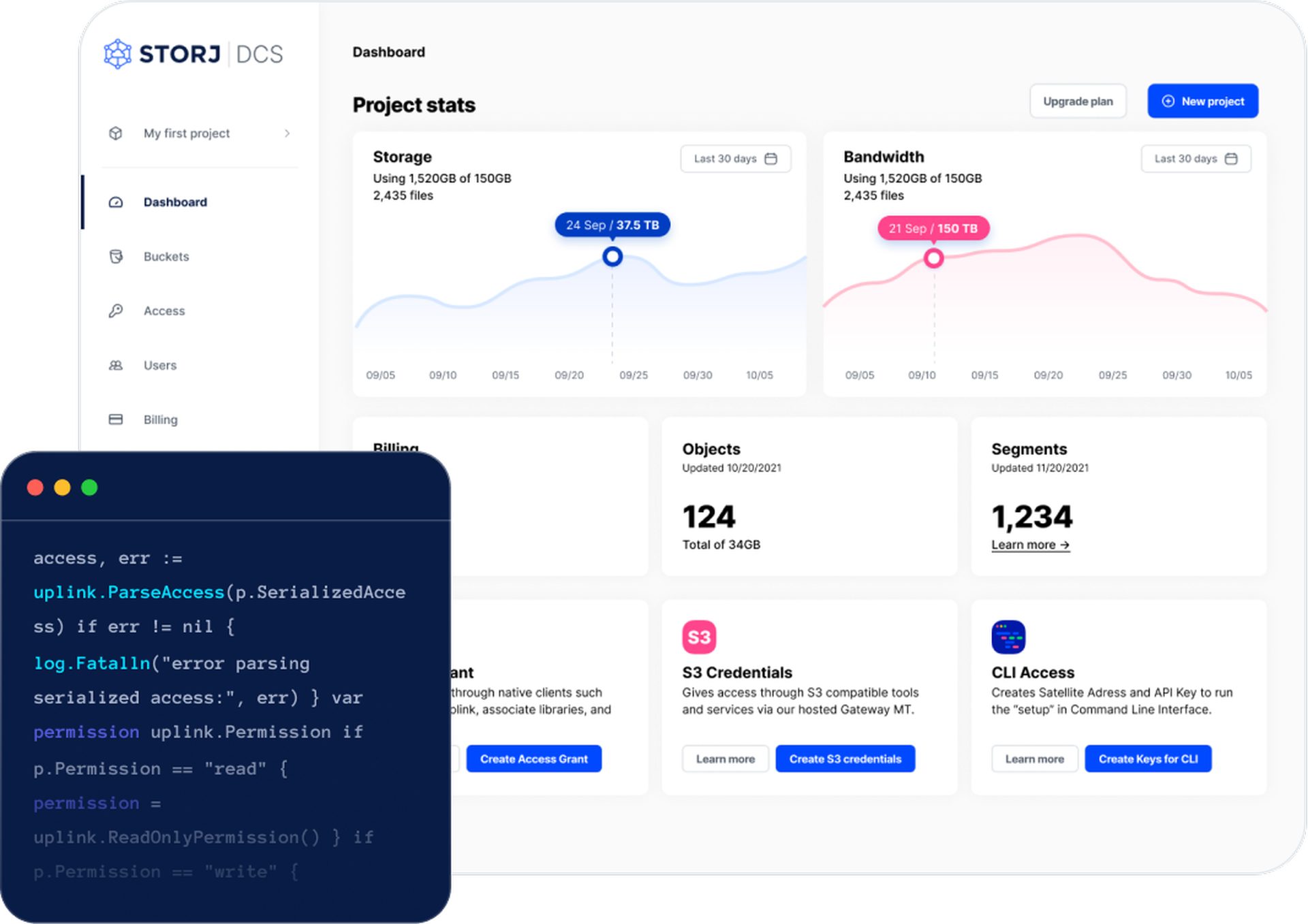
James Prestwich, Tome Boshevski, John Quinn, and Shawn Wilkinson founded Storj. In July 2014, the platform was put into use. A significant travel benefit comes from using Storj cloud storage.
Using its faster service, you can swiftly access your files from several storage nodes. The network also offers end-to-end encryption storage with great security to guarantee that only the data owners may access them. Data that is saved is duplicated and not only spread across several hosts but is also not kept in a single node. As a result, none of the file hosts—even those that keep files in encrypted form—have an exact duplicate of the contents.
Sia
One of Storj’s main rivals, Sia, offers a comparable service. Sia utilizes unused hard drive space from users worldwide, as is typical with practically all decentralized storage networks. However, The Sia Network has an intriguing notion because its host servers and users are distributed widely and fairly evenly throughout the world. Distributed across multiple nodes and locations, stored files are encrypted. Therefore, even if you always have access to them using your unique private encryption keys, your data are not kept in one location. This has the benefit of reducing the likelihood of stored file security failures.
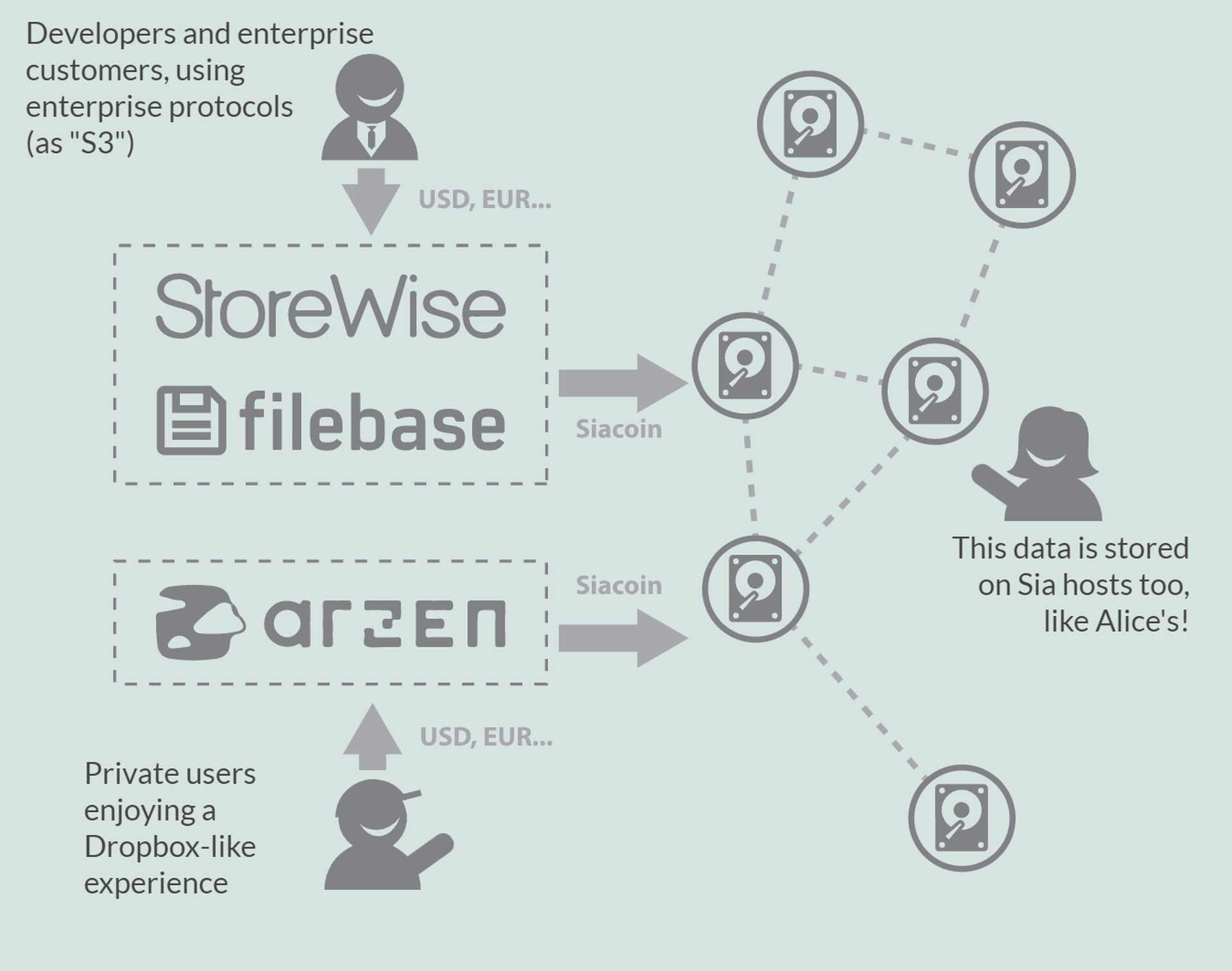
Sia presently has 907 active hosts and a storage capacity of around 4.5 PB.
Filecoin
Filecoin believes that widespread use of its cloud storage solutions would quickly reduce the price of cloud storage. Additionally, it intends to work with other cryptocurrency blockchains to realize its primary goal of providing accessible and affordable storage for all data types.
🌳 Filecoin is the world’s most transparent blockchain regarding electricity consumption. Take a look at the @filecoingreen dashboard and API to analyze the energy use of any node in the network: https://t.co/Qd74gmuuSA pic.twitter.com/btPohXt7dg
— Filecoin (@Filecoin) May 16, 2022
Additionally, the platform uses end-to-end encryption as a security safeguard. Users can store files following their preferences based on pricing caps, redundancy levels, and file retrieval times.
Internxt
Open-source, end-to-end encrypted cloud storage is available through Internxt. Internxt is making great progress toward creating a full privacy ecosystem of decentralized online services to serve as a contemporary, moral, and more secure cloud alternative to Big Tech firms like Google.
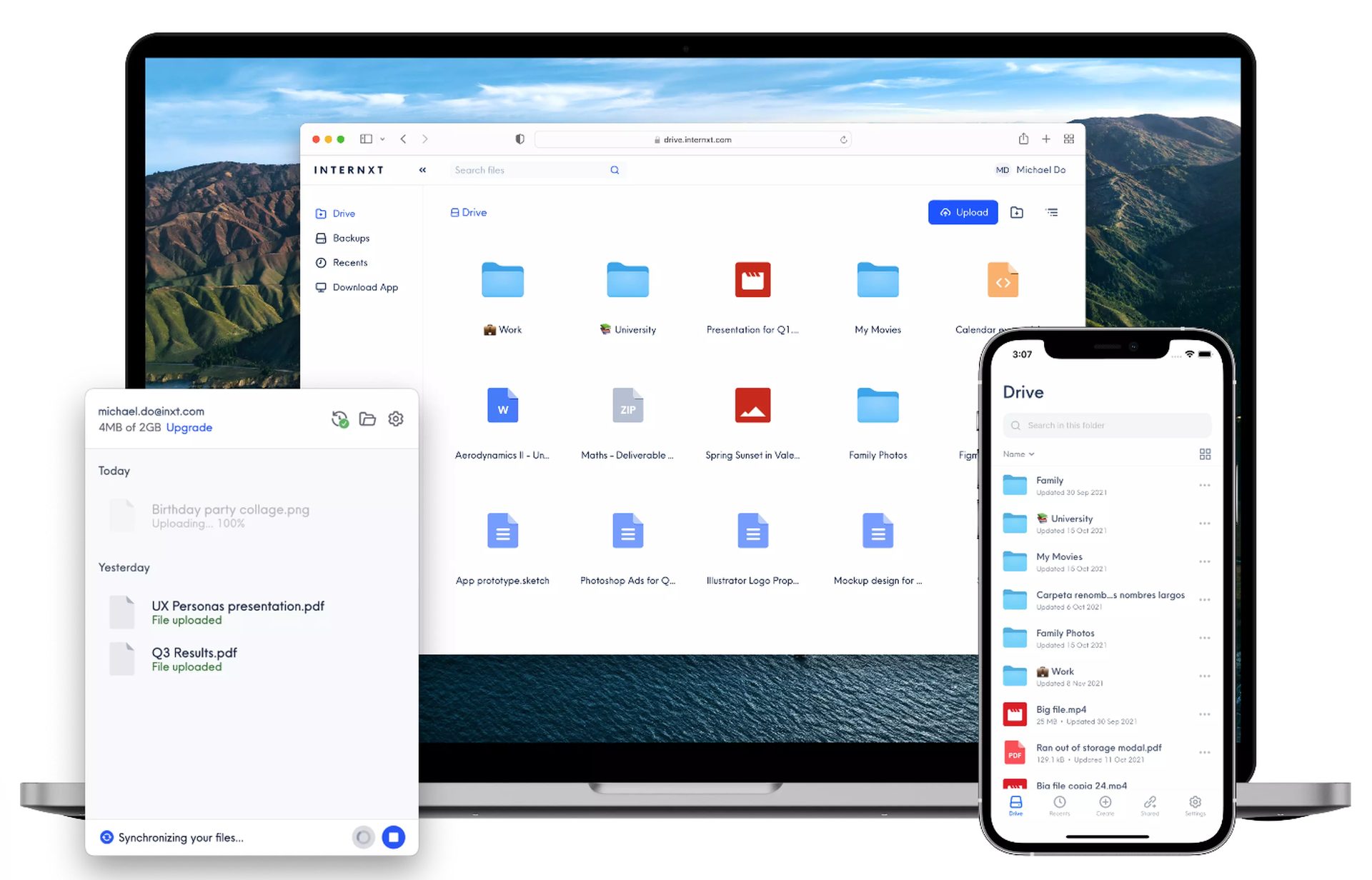
Internxt’s cloud service disperses and fragments data across a massive peer-to-peer network of numerous distributed professional network operators using Ethereum’s proof-of-work blockchain.
Akash Network
The decentralized finance (DeFi) market and programmers interested in developing decentralized apps are Akash Network’s main target audiences (dApps).
Akash Network is a Cosmos-based Proof-of-Stake (PoS) blockchain built with interoperability in mind using the Cosmos SDK. At its core, Akash is a decentralized, open-source cloud services marketplace and self-described “DeCloud for DeFi.”
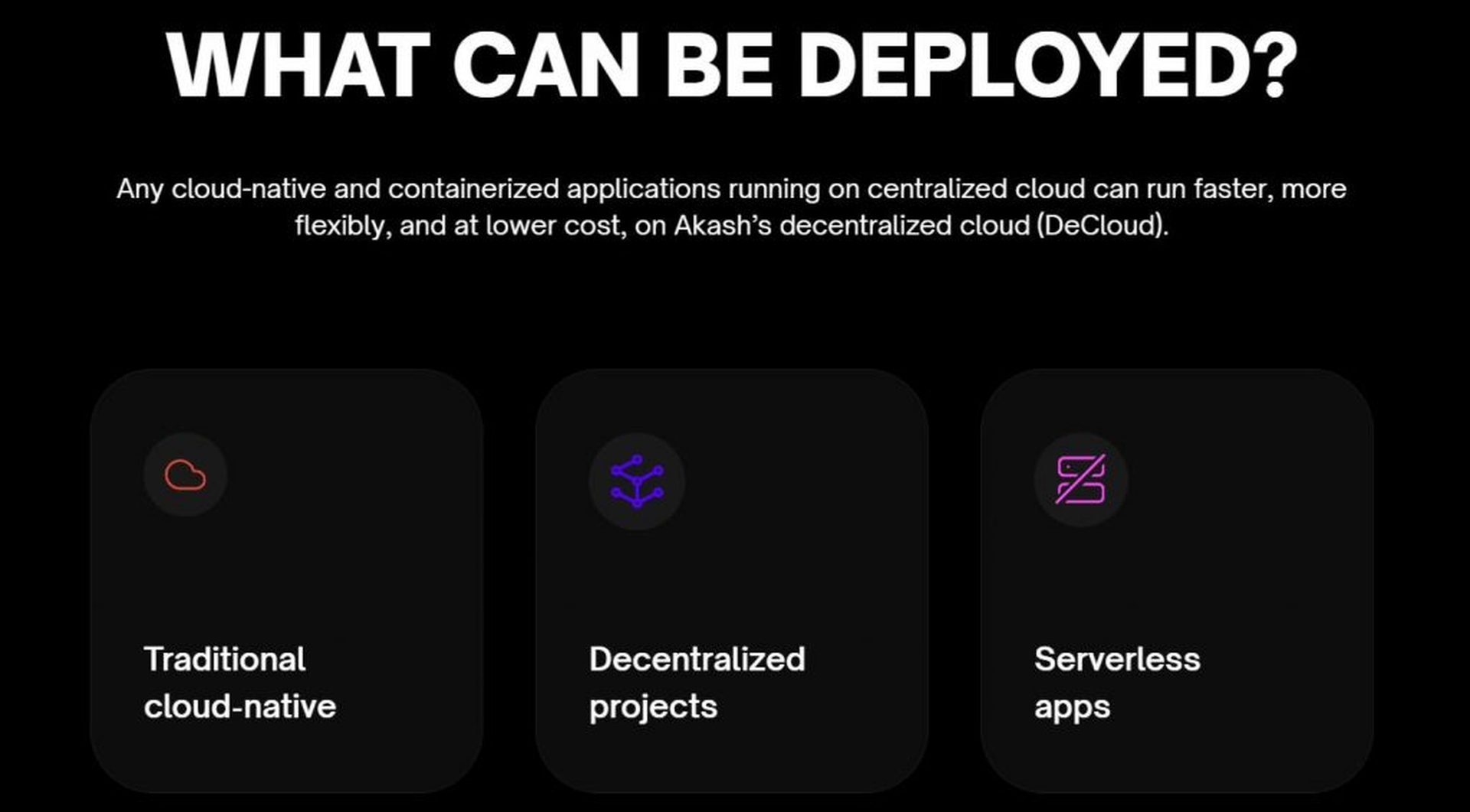
The primary goals of this project are to provide faster, more affordable, and more effective decentralized data storage options for cloud-based applications.
Are they any free decentralized cloud storage?
Utopia is one of the best free decentralized cloud storage with its proven structure.
Utopia
Utopia is making progress toward its objective by developing a distinctive ecosystem that incorporates a wide range of services. They help individuals, corporations, and government officials all benefit from the platform. Of course, any sensitive data will be stored with the highest level of security.
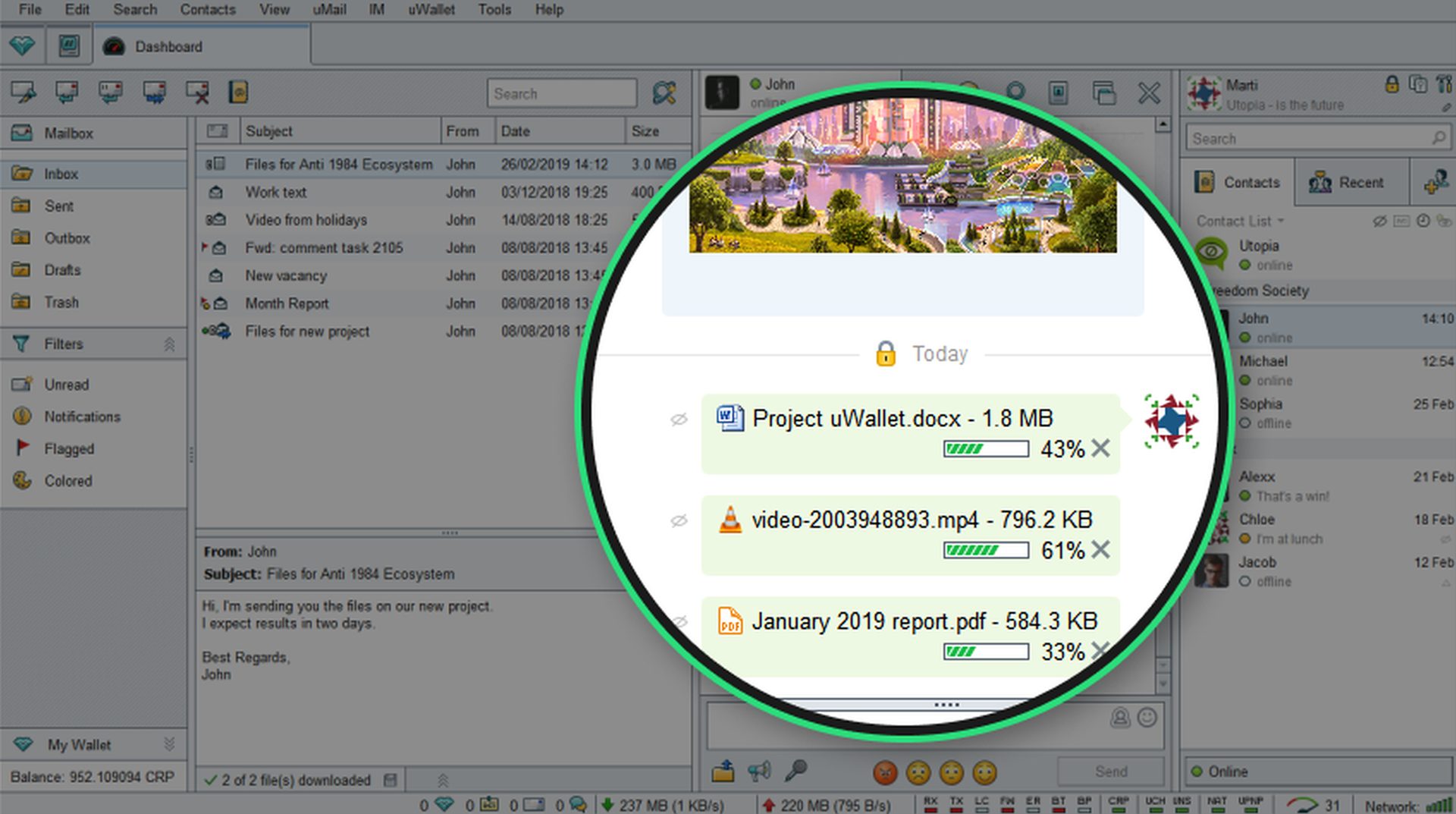
The storage and other tools are protected using cutting-edge AES 256bit (longest key) and Curve25519 encryption. This guarantees complete user security and privacy because even a supercomputer cannot prevent hacking for free.
How to choose a blockchain cloud storage?
When considering decentralized storage choices, keep the following four factors in mind:
- Persistence mechanism
- Data retention enforcement
- Decentrality
- Consensus
Let’s explore what they mean.
Persistence mechanism
Data must be stored in a decentralized network safely and securely, which requires a persistence mechanism or an incentive system. Each decentralized storage provider has its own incentive structure and persistence technique since Ethereum, for example, uses a persistence mechanism known as “blockchain-based persistence,” which is not viable for efficiently storing vast amounts of data.
Data retention enforcement
Cryptographic tests are frequently used to determine whether a node still holds data, and data retention enforcement is a system that makes sure that data is preserved. Arweave’s Proof-of-access mechanism is an illustration of how data retention is enforced. The challenge that nodes must complete examines whether data is present in the most current node and a chosen node from the past. Nodes are punished when they are unable to accomplish the challenge.
Decentrality
While there is a one-size-fits-all method to assess how “decentralized” a storage provider is, it is wise to use tools and services requiring a specific KYC level to gauge their decentralization.
Consensus
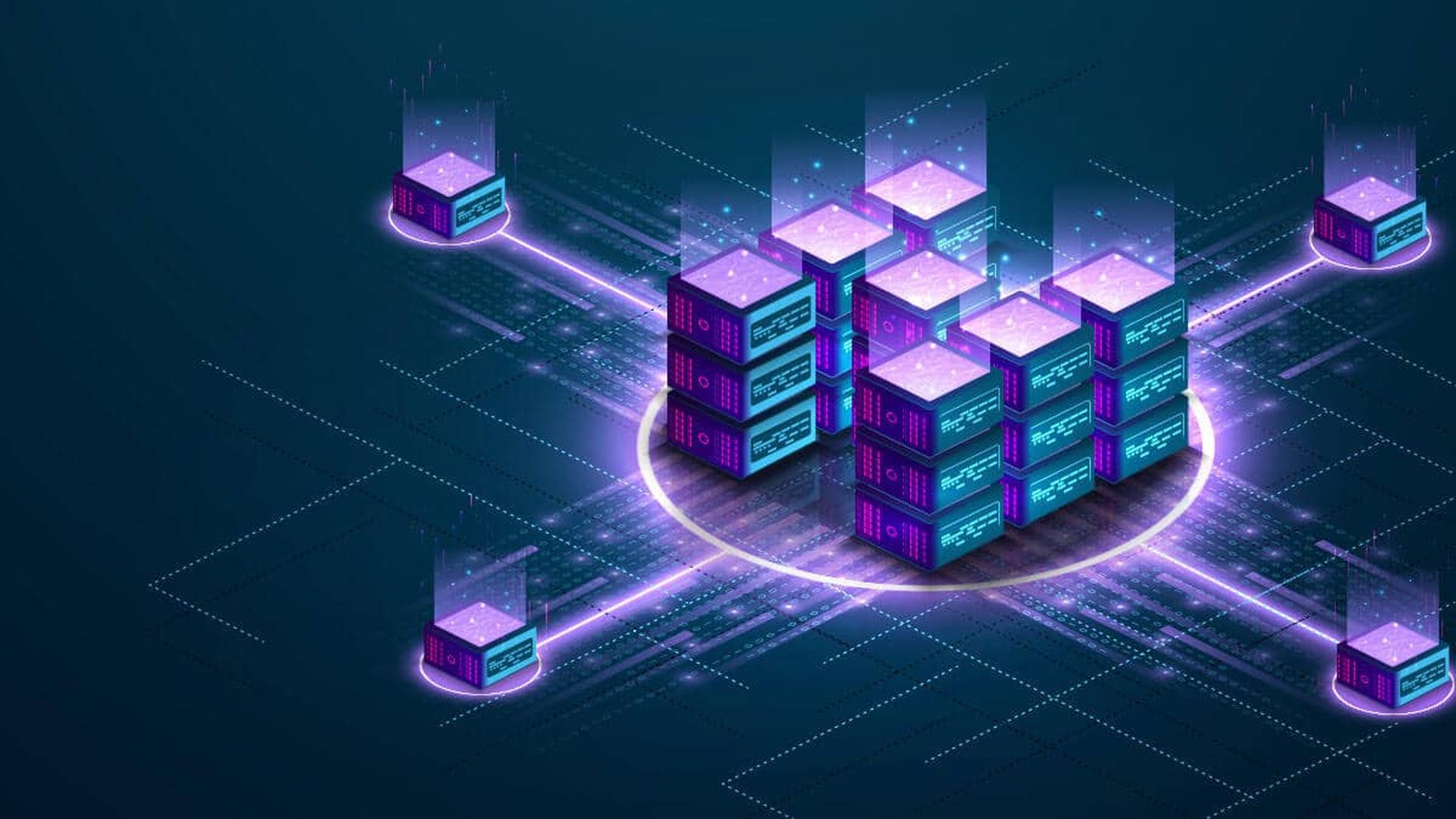
Simply put, the consensus is the process by which all the nodes in a blockchain network or decentralized storage network come to an understanding of the current state of the distributed ledger. While every decentralized storage provider may have its own consensus process, most other systems are based on proof-of-stake (PoS) and proof-of-work (PoW), the two popular mechanisms.
What is the difference between blockchain and cloud?
- A cloud is something to which the internet provides access. We may access the data online digitally. However, blockchain is an encrypted system that stores data in secure databases using a variety of encryption algorithms and hashes. These data records are dispersed over different nodes by the system, which then agrees on the location of the data they contain.
- Most cloud computing is based on a conventional database structure, where the participant machines are where the data is stored. On the other hand, the blockchain is an untouchable and trustworthy online database registry of different digital transactions where participants can change the data with all parties’ consent.
- Organizations like Amazon Web Services (AWS), Alibaba Cloud, Google, IBM, and Microsoft offer cloud computing services. At the same time, blockchain technology is used by initiatives like Ethereum, Bitcoin, Hyperledger Fabric, and Quorum.
Can we use blockchain as a database?
A blockchain is a database because its main function is to store data. Only how they store data sets blockchains apart from other database systems.
While databases can be considered a type of blockchain, this is not always the case. Signed blocks are typically not used in databases to store data.
How much data can be stored in a blockchain block?
Blockchain size restrictions are modest by the standards of contemporary data storage because cryptographic transactions require very little data storage. Although the maximum block size for Bitcoin is 1 MB, this little bit of information can hold more than 2000 transactions.

If you’re talking about blockchain size, there truly is no limit unless there is some restriction in the original coding. There is 1MB every block, which is generated every 10 minutes (for BTC). The Ethereum blockchain has topped 1TB, whereas the Bitcoin blockchain is a little over 300 terabytes.
Comparison: Blockchain storage vs cloud storage
In comparison to centralized cloud storage, blockchain storage may be more affordable, secure, and dependable.
Centralized cloud storage providers prevent data loss by copying the data and storing it in many data centers. This procedure duplicates a lot of data, which can result in an excessive amount of surplus data. Additionally, cloud storage’s data centers need hardware that meets business standards. These elements might make blockchain storage substantially more expensive than centralized storage.
Blockchain storage advocates assert that it can reduce the cost of centralized cloud storage by up to 90% by utilizing the free space on users’ devices worldwide. Renting out idle space on their hard drives to third parties can be profitable for individuals and companies.
Is blockchain cloud storage technology safe?
Decentralized cloud storage is just as safe as centralized cloud solutions like those provided by AWS, assuming the platform has been properly developed and executed.
Conclusion
Customers have better autonomy over and access to their data thanks to decentralized data storage marketplaces. As a new generation of platforms boosts the flexibility and security of cloud storage while decreasing prices for end users, demand for decentralized cloud storage is quickly rising. While some decentralized storage networks want to compete with and topple the current cloud storage oligopolies, others want to partner with them to improve and expand their products.
Users can gain from improved data security through redundancy by storing data over a decentralized peer network.
Blockchain-based cloud storage’s interconnected blocks, hashing operations, and decentralized architecture properly balance security and scalability. The technology is the best option for enhancing cloud storage’s security. Businesses can lower their IT costs, improve security, and streamline information flow by carefully integrating Blockchain technology into cloud storage.




